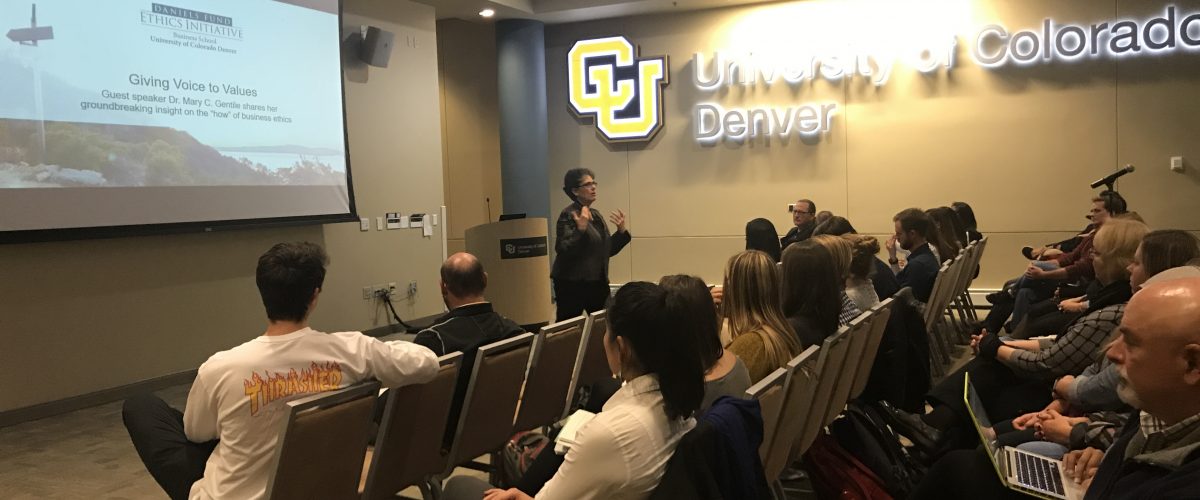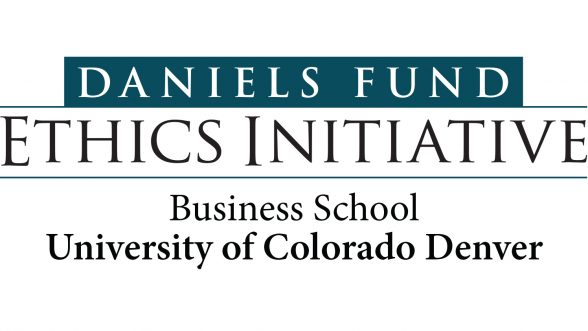
Most of us consider ourselves generally good people, and we know, in our gut, when something just feels off or wrong. But sometimes, it’s our boss or colleague, or just someone we respect asking us to do something that we know we shouldn’t. Then we’re stuck wondering things like, “Should I tell my boss I can’t do this?”, “Will I get fired?”, “How do I say ‘no’ without letting everyone down?” Dr. Mary Gentile has spent years researching the “how” of business ethics and she joined over 100 students, faculty, staff, and community members to share her real-world perspective and tools on facing ethical challenges in our daily lives.
Giving Voice to Values (GVV) is a curriculum developed by Dr. Gentile and piloted in over 1,000 schools, companies, and other organizations worldwide that offers practical exercises, cases, modules, scripts and teaching plans for handling a wide range of ethical conflicts in the workplace. Dr. Gentile developed the program in response to the sometimes too hypothetical typical classroom discussions on ethics.
While sitting in a classroom and debating one way or another for a hypothetical dilemma can be interesting and valuable, it is not necessarily practical – not very applicable to our daily lives.
GVV focuses on real-world scenarios when we have already decided that something is not right, and invites us to develop scripts and action plans for what to do then.
Dr. Gentile has found that those among us that are successfully able to navigate an ethically sticky situation are often simply better practiced. GVV offers dozens of real-life scenarios for faculty to integrate within the classroom discussion, and argues that after enough practice – learning from others who have done this effectively, crafting scripts that present our views in the most compelling ways while respecting the needs and concerns of those we hope to influence, actually physically saying the words out loud, and working collaboratively to develop successful action plans – standing up for our values becomes much easier.
“Not only is it less ‘scary’ the fifth, tenth, or hundredth time around, but your mind and body are literally ready for it – just like a tennis player’s backswing is almost involuntary after enough practice, so can our ‘ethical muscle memory’ automatically react in a calm, thoughtful, and productive manner under stress,” Dr. Gentile said.
During a Q&A session, Business School student Janet Cano-Franco asked Dr. Gentile, “I might know that something is wrong, but how can I make my boss or colleague care?”
Dr. Gentile proposed that we can view the moral compass of any given group as a bell curve. At one end are those who self-identify as “opportunists”, openly selfishly motivated individuals, and at the other end are those that self-identify as “idealists”, always striving to “do the right thing” and be as selfless as possible. Most people then lie somewhere in the middle – the pragmatists.
“I don’t believe I have the power to change the opportunists; I think they will always be with us,” Dr. Gentile said.
But what the idealists and pragmatists can do is change the water that the opportunists swim in, by slowly and incrementally changing the moral climate of their offices, classrooms, and communities, so that it ultimately becomes in the opportunists’ best interest to ride with our current.
Hosted by the Daniels Fund Ethics Initiative (DFEI) at the University of Colorado Denver Business School, the event also served as a jumping off point for the new DFEI at the CU Denver Business School Ethics Fellowship, a program designed by DFEI Director Roger Stace to make it easy and accessible for Business School Faculty to integrate practical ethics-based discussions into the curriculum.
“The Daniels Fund Ethics Initiative has allowed us the opportunity to further strengthen our ethical foundation here at the Business School,” said Stace. “Giving Voice to Values is a powerful tool that our new Ethics Fellows will use to help students develop life-long integrity and ethical fortitude.”
The CU Denver Business School received a five-year grant in 2015 to participate in the Daniels Fund Ethics Initiative Collegiate Program, aimed at strengthening ethics education for business students and extending ethical behavior beyond campus and into the community. The DFEI at the CU Denver Business School seeks to strengthen the teaching of principle-based ethics, promotes the practical application of ethics-based principles in the curriculum, provides students opportunities to practice ethical leadership and ethical decision-making, and engages the business community.


